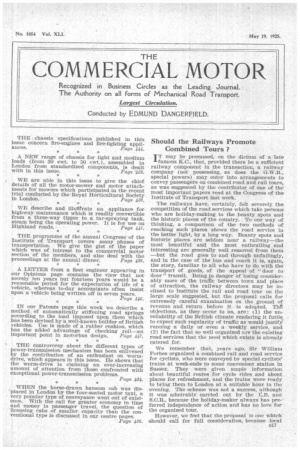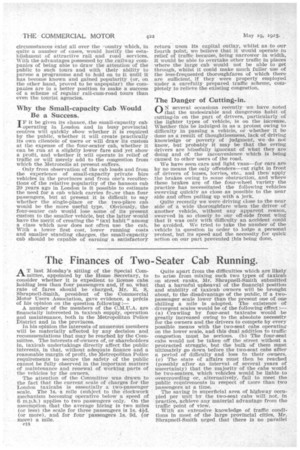Should the Railways Promote Combined Tours ?
Page 1

Page 2

If you've noticed an error in this article please click here to report it so we can fix it.
TT may be presumed, on the dictum of a late famous K.C., that, provided there be a sufficient railway component in the transaction, a railway company (not possessing, as does the G.W.R., special powers) may enter into arrangements to convey passengers on combined road and rail tours, as was suggested by the contributor of one of the most important papers read at the Congress of the Institute of Transport last week.
The railways have, certainly, felt severely the competition of the road services which take persons who are holiday-making to the beauty spots and the historic places of the country. To our way of thinking, a comparison of the two methods of reaching such places shows the road service in the better light, by a long way. Beauty spots and historic places are seldom near a railway—the most beautiful and the most enthralling and Interesting are generally well removed from them —but the road goes to and through unfailingly, and in the case of the bus and coach it is, again, the story, familiar to all who have to do with the transport of goods, of the appeal of "door to door" transit. Being in danger of losing considerably more of the trac between town and place of attraction, the railway directors may be inclined to institute the rail and road tour on the large scale suggested, but the ,proposal calls for extremely careful examination on the ground of revenue and return before it is adopted. Thg objections, as they occur to us, are : (1) the unreliability of the British climate rendering it futile to expect such regularity of traffic as would justify running a daily or even a weekly service, and (2) the fact that so well organized !tre the existing road services that the need which exists is already catered for.
We remember that, years ago, Sir William Forbes organized a combined rail and road service for cyclists, who were conveyed by special cyclists' trains at week-ends to some convenient station in Sussex. They were given ample information about beautiful routes for cycle rides and about places for refreshment, and the trains were ready to bring them to London at a suitable hour in the evening. The scheme was not a success, although it was admirably carried out by the J.B. and S.C.R., because the holiday-maker always has preferred independence of action and has no love for the organized tour. However, we feel that the proposal is one which should call for full consideration, because local circumstances exist all over the ,-ountry which, in quite a number of cases, would justify the establishment of attractive rail and road services. With the advantages possessed by the railway companies of being able to draw the attention of the public to such tours and with their ability to pursue a programme and to hold on to it until it has become known and gained popularity (or, on the other hand, proved to be unpopular) the companies are in a better position to make a success of a scheme of regular rail-cum-road tours than even the tourist agencies.
Why the Small-capacity Cab Would Be a Success.
T F it be given its chance, the small-capacity cab operating in London and in busy provincial centres will quickly show whether it is required by the public, whether it will create practically its own clientele of users or will draw its custom at the expense of the four-seater cab, whether it can be run at a slightly lower fare and yet show a profit, and whether it will operate in relief of traffic or will merely add to the congestion from which the Metropolis at present suffers. Only from observation of the cab loads and from the experience of small-capacity private hire vehicles in the provinces and from one's recollections of the relative popularity of the hansom cab 20 years ago in London is it possible to estimate the need for a. cab which carries fe,..-er than four passengers, but at present it is difficult to say whether the single-place or the two-place cab would be the more useful type. Obviously, the four-seater cab would lose some of its present custom to the smaller vehicle, but the latter would have the merit of creating the "taxi habit" among a class which now does not often use the cab. With a lower first cost, lower running costs and smaller standing 'charges, the small-capacity cab should be capable of earning a satisfactory return unon its capital outlay, whilst as to our fourth point, we believe that 'it would operate in relief of traffic because, being narroWer in width, it would be able to overtake other traffic in places where the large cab would not be able to get through, whilst it could make much. fuller use of the less-frequented thoroughfares of which there are sufficient, if they were properly employed under a carefully prepared traffic scheme, completely to relieve the existing congestion.
The Danger of Cutting-in.
ON several occasions recently we have noted that the undesirable and dangerous habit of cutting-in on the .part of drivers, particularly of the lighter types of vehicle, is on the increase. Whether this be indulged in as a protest owing to difficulty in passing a vehicle, or whether it be done as a result of thoughtlessness, lack Of driving knowledge or poverty of judgment, we do not know, but probably it may be that the erring drivers are blissfully ignorant of what they are doing and of the inconvenience which is being caused to other users of the road. We have seen cars and light vans—for cars are by no means the only offenders—cut right in front of drivers of buses, lorries, etc., and then apply the brakes owing to some obstruction,. and where these brakes are of the four-wheel variety the practice has necessitated the following vehicles swerving quickly as close as possible to the near side and often pulling up with a jerk. Quite recently we were driving close to the near side of a wide thoroughfare when the driver of another vehicle, without any apparent reason, swerved in so closely to our off-side front wing that it was only with difficulty an accident could be avoided. We tried to take the number of the • vehicle in question in order to lodge a personal Protest, but its speed and the necessity for quick action on our part prevented this being done.




























